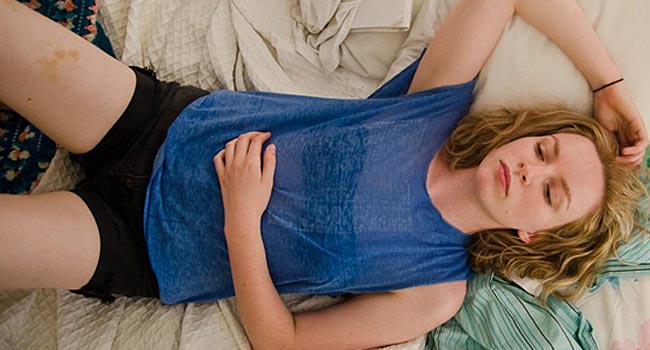
There are some qualities about I Used to Be Darker that can be appreciated from a technical standpoint, but it is too underwhelming to leave a lasting impression.

There are some qualities about I Used to Be Darker that can be appreciated from a technical standpoint, but it is too underwhelming to leave a lasting impression.
A natural reaction towards conflict is avoiding the threat by escaping, a common theme found within Matt Porterfield’s indie drama I Used to Be Darker. It is hard to say if the film achieves what it intends to, because frankly I am not confident what the true intentions are. Porterfield seems content with focusing on the music and family drama while mostly ignoring exposition of the characters. The end result is a film that feels very natural given the non-actors and realistic situations, but also one that is too subtle to be truly effective.
For reasons not revealed until the very end, Taryn (Deragh Campbell) decides to visit her aunt and uncle’s at their home in Baltimore. Her unexpected visit comes at an incredibly inconvenient time for the husband and wife as they are in the middle of a separation, though they do their best to accommodate their guest despite their marriage problems. Taryn’s cousin Abby (Hannah Gross) is understandably having a difficult time dealing with her parent’s separation; most evident when she attempts to make waffles at her father’s house only to realize that the waffle maker is now at her mother’s, resulting in verbal outbursts and an emotional breakdown. Needless to say, this puts Taryn in an awkward position to come forth with her own issues.
The fact that Taryn’s uncle Bill (Ned Oldham) and aunt Kim (Kim Taylor) are musicians plays a very crucial role in the film. Not only does it serve as a dramatic plot point when Kim starts to sleep with a member of her band, but it naturally benefits the film when they preform musical interludes—which end up being the most memorable scenes the film has to offer. While it is easy to tell that the two are talented musicians in real-life—the soundtrack is undeniably good—their lack of acting experience is equally as obvious.

There are plenty of long takes in I Used to Be Darker and for the most part they work well in capturing the different states of emotion these characters go through. Specifically, the long takes allows us to see when the characters cross over into their breakdown stage. The best example of this is when Bill sings and calmly strums an acoustic song for a full 3 minutes before standing up and violently smashing his guitar in half. But there are some uses of the long takes that loiter enough for the storyline to stall and ultimately become tiresome.
The deliberate pacing and lack of dynamic range makes I Used to Be Darker a demanding film to sit through, especially considering the payoff is nonexistent. The emotional punch the film aims for feels more like a gentle nudge because the characters are not as interesting as the situation they are in, thus there is very little reason to care about them when we are asked to. There are some qualities about I Used to Be Darker that can be appreciated from a technical standpoint, but the film is too underwhelming to leave a lasting impression.